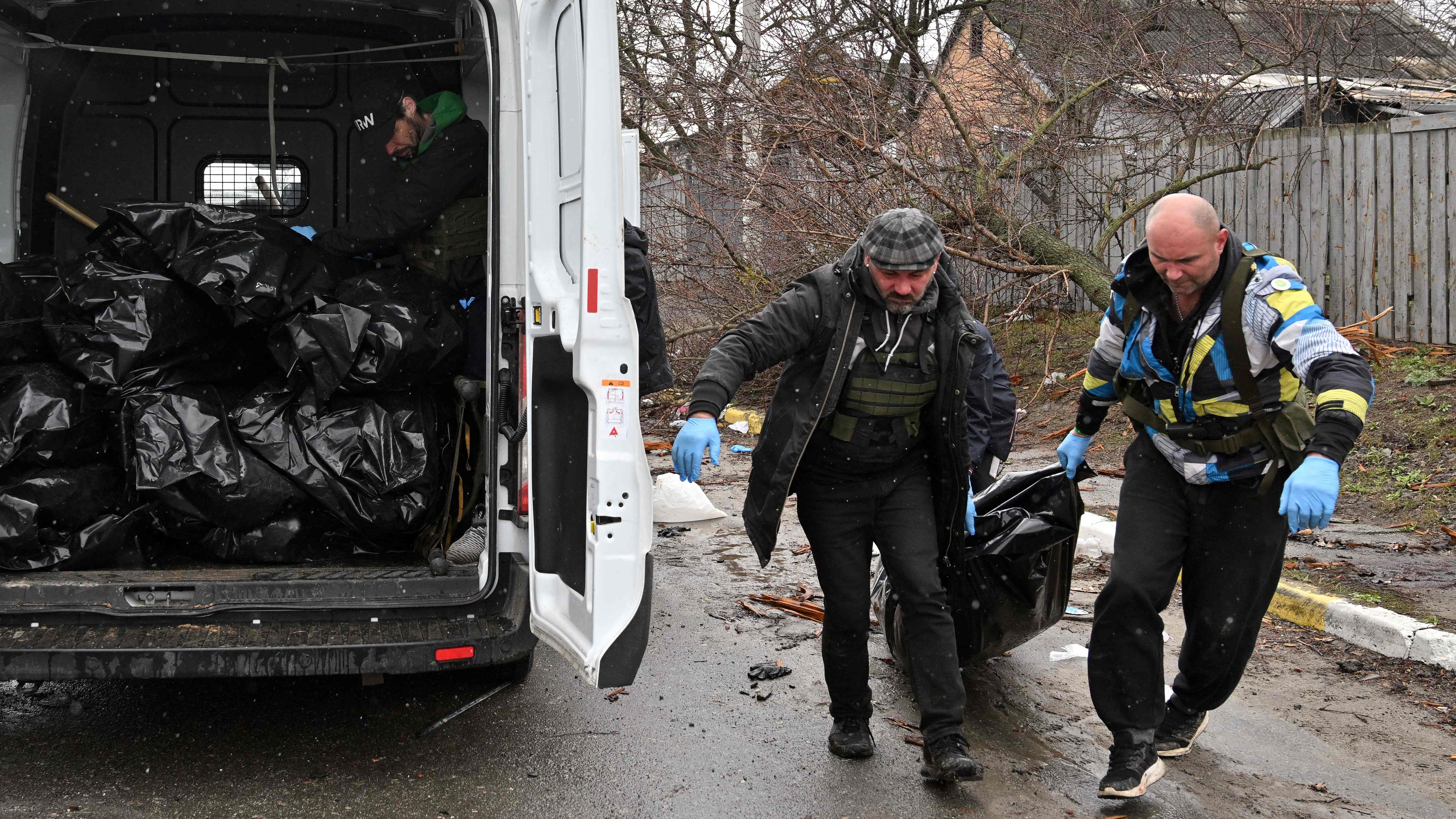What is the definition of genocide?
Russia accused of mass civilian killings in areas surrounding Kyiv

A free daily email with the biggest news stories of the day – and the best features from TheWeek.com
You are now subscribed
Your newsletter sign-up was successful
Russia has been forced to deny allegations that its troops committed genocide in Ukraine after images emerged of mass graves and civilian bodies in the town of Bucha.
Western outrage intensified amid claims that Ukrainian civilians had been murdered, with EU leaders denouncing “massacres”, “atrocities” and “possible genocide”. The Kremlin, meanwhile, rejected the possibility that its troops targeted civilians during their retreat from areas surrounding Kyiv.
The term genocide was coined by Polish lawyer Raphäel Lemkin in 1944 in his book Axis Rule in Occupied Europe, according to the United Nations. But what does it mean – and when does wartime killing constitute an act of genocide?
The Week
Escape your echo chamber. Get the facts behind the news, plus analysis from multiple perspectives.

Sign up for The Week's Free Newsletters
From our morning news briefing to a weekly Good News Newsletter, get the best of The Week delivered directly to your inbox.
From our morning news briefing to a weekly Good News Newsletter, get the best of The Week delivered directly to your inbox.
What is genocide?
The word genocide consists of the Greek prefix genos, meaning race or tribe, and the Latin suffix cide, meaning killing. The act was first codified in 1948, in the Convention on the Prevention and Punishment of the Crime of Genocide.
According to PBS, the treaty outlines five acts that can constitute genocide if they are done “with the intent to destroy an ethnic, national, racial or religious group”.
These are killing members of the group; causing serious bodily or mental harm; deliberately inflicting conditions of life calculated to bring about the group’s physical destruction in whole or in part; imposing measures intended to prevent births; and forcibly transferring children.
To qualify as genocide, the actions “must be done with intent to eliminate an entire group of people”, the broadcaster added. Without provable intent, a group or individual may instead be charged with “crimes against humanity” or “ethnic cleansing”.
A free daily email with the biggest news stories of the day – and the best features from TheWeek.com
What is wrong with this definition?
According to the BBC, the UN treaty has “come under fire from different sides”, mostly by people “frustrated with the difficulty” of applying the term genocide to specific cases.
Among the main complaints are that the convention excludes targeted political and social – rather than purely ethnic – groups; is limited to direct acts against people and omits acts against the environment that sustains the victims or their cultural distinctiveness.
But the most troubling issue is that war crime tribunals have struggled to establish a legal standard for genocidal intent. “Few perpetrators, with the notable exception of the Nazi regime, left explicit plans detailing their intentions to eradicate groups,” PBS said.
“Genocide is distinguishable from all other crimes by the motivation behind it,” said Alain Destexhe, former secretary general of Médecins Sans Frontières, in his book Rwanda and Genocide in the 20th Century.
The waters are muddied by incorrect usage of the word, which has fallen victim to “a sort of verbal inflation, in much the same way as happened with the word fascist”, he added.
This warning is echoed by Michael Ignatieff, former director of the Carr Centre for Human Rights Policy at Harvard University, who the BBC said described the transatlantic slave trade is an example of the term being misused.
Slavery is often described as having been genocidal, he has said in public lectures, when in fact “it was a system to exploit, rather than to exterminate the living”.
-
 ‘My donation felt like a rejection of the day’s politics’
‘My donation felt like a rejection of the day’s politics’Instant Opinion Opinion, comment and editorials of the day
-
 Trump wants a weaker dollar but economists aren’t so sure
Trump wants a weaker dollar but economists aren’t so sureTalking Points A weaker dollar can make imports more expensive but also boost gold
-
 Political cartoons for February 3
Political cartoons for February 3Cartoons Tuesday’s political cartoons include empty seats, the worst of the worst of bunnies, and more
-
 Syria’s Kurds: abandoned by their US ally
Syria’s Kurds: abandoned by their US allyTalking Point Ahmed al-Sharaa’s lightning offensive against Syrian Kurdistan belies his promise to respect the country’s ethnic minorities
-
 Israel retrieves final hostage’s body from Gaza
Israel retrieves final hostage’s body from GazaSpeed Read The 24-year-old police officer was killed during the initial Hamas attack
-
 China’s Xi targets top general in growing purge
China’s Xi targets top general in growing purgeSpeed Read Zhang Youxia is being investigated over ‘grave violations’ of the law
-
 Panama and Canada are negotiating over a crucial copper mine
Panama and Canada are negotiating over a crucial copper mineIn the Spotlight Panama is set to make a final decision on the mine this summer
-
 Why Greenland’s natural resources are nearly impossible to mine
Why Greenland’s natural resources are nearly impossible to mineThe Explainer The country’s natural landscape makes the task extremely difficult
-
 Iran cuts internet as protests escalate
Iran cuts internet as protests escalateSpeed Reada Government buildings across the country have been set on fire
-
 US nabs ‘shadow’ tanker claimed by Russia
US nabs ‘shadow’ tanker claimed by RussiaSpeed Read The ship was one of two vessels seized by the US military
-
 How Bulgaria’s government fell amid mass protests
How Bulgaria’s government fell amid mass protestsThe Explainer The country’s prime minister resigned as part of the fallout